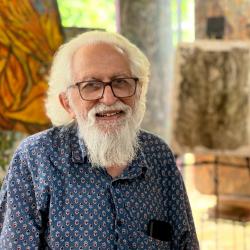
Jyoti Sahi
A democratization of art, drawing from folk culture that is in direct contact with the realities of those who live close to the cycles of nature, represents a modern outlook that draws inspiration from contemporary reality. Such an art, by being more accessible for those involved with today’s political concerns, has an energy that is the source of a socially engaged vision. It is in this sense that one can see in the art of Nandalal Bose what Ananda Coomaraswamy (1877-1947) termed a “true Swadeshi”, as opposed to the “false Swadeshi” that draws from an imagined past.
Jyoti Sahi is a practicing artist and writer concerned with symbols important in Indian culture. Jyoti Sahi is also noted as art teacher and runs an ‘Art Ashram’ in Silvepura, Bengaluru. He provided the cover for the first book in the "long form conversation" series, titled Abundant Love, published in the UK by Triarchy Press. See the book here: https://www.triarchypress.net/satish.html. Jyoti Sahi made this design, inspired by the ecological movement that ensures the diversity of native seeds, sustaining the life of the community.
This graphic symbol of a seed is depicted with a ‘chakravyuha’, or Indian labyrinth, embedded in its layered form. Jyoti Sahi found this ritual maze in a folk shrine, at Bannerghatta by Bengaluru, near what is now India's technology hub. This labyrinth is marked out with stones, delineating a path that leads to its centre. Local pilgrims walk this labyrinth in the belief that it will bring life's blessing to the family. The seed symbolizes the promise of life. The labyrinth holds the secret to life, which is like a maze enfolding the Divine Presence hidden at its centre. Walking into the labyrinth, performs a ritual process of uncovering the embodied ‘Atma’, or Self, lying at the seed’s heart.

